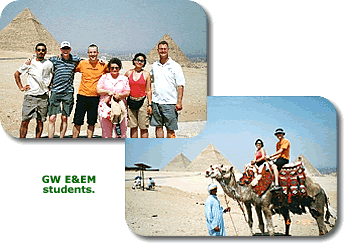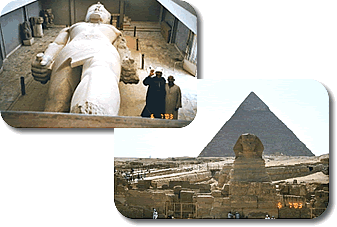A group of GW environmental students, including E&EM doctoral student Laura Verduzco, recently visited Egypt to learn about environmental conditions and environmental protection programs in Egypt. The trip turned out to be a wide-ranging one, including visits to Cairo City, Aswan, Edna, Esfu, Komombo, Luxor, Alexandria, Sharm-El-Sheik and the Sinai Protectorate.
According to doctoral candidate Verduzco, “the trip proved to be a very interesting one. The group had the chance to learn about the people, the culture, the history and the magic of Egypt. From an environmental point of view I learned that there is a lot to do in Egypt in order to improve the air, land and water quality.” While the students observed problems such as garbage in the streets, low visibility due to high concentrations of particulate matter in the atmosphere, and poor water quality in the Nile River, they also found that the country’s environment is improving. As Laura sated “behind the haze and the garbage there is a large group of researchers and managers based in Cairo city that are fighting hard to bring this country to sustainability.”

The Ministry of State for Environmental Affairs in Egypt has introduced tremendous changes in environmental policy. (Former Egyptian Minister of the Environment Dr. Nadia Edeid was the keynote speaker at the graduation ceremonies of GW’s School of Engineering and Applied Science in 2000.) Through the Egypt Environmental Affairs Agency, the Ministry has implemented strategies like the air quality monitoring network, contingency plans, hazardous materials handling programs, solid waste management, emissions control, exhausts control, spills control, and environmental laws to improve air, water and land quality.


According to the GW visitors, there remains a lot to do in order to achieve a strong sustainable basis, but the Egyptian authorities are on the right track. Realistic programs to enhance the economic, social and environmental quality are being implemented through five-year plans that the government has developed in collaboration with all the ministries. The combination of these three programmatic areas (economic, social and environmental) promises to lead to long-term sustainability in the future.


